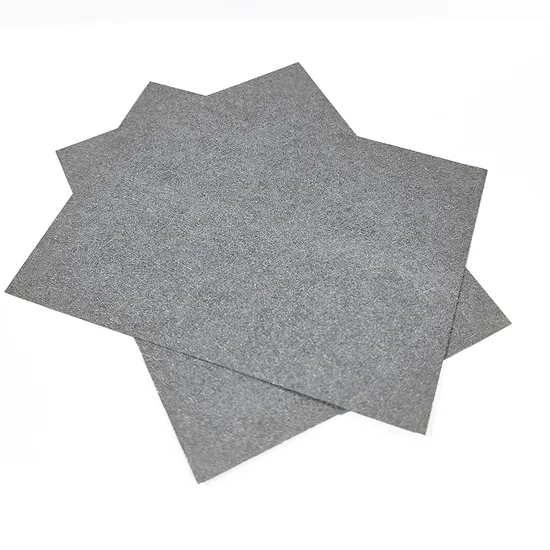
Industrial Grade Titanium Sintered Felt 50-90% Porosity Titanium Fiber Felt for Aerospace & Medical Filters
Basic Info.
Model NO.
BH-TI-010~150MM
Technique
Powder Sintered
Grade
GR5
Shape
Square
Model No.
Titanium Sintered Fiber Felt
Fiber Diameter
0.02 -0.05 mm or Others
Weight
50-1000g or Others
Thickness
0.1-1.5 mm or Others
Transport Package
Moisture Proof Paper+Bubble Wrap+Paper Tube/Wooden
Specification
20-80% porosity
Trademark
BeiHai
Origin
Jiujiang, China
HS Code
7326901100
Production Capacity
100000sqm/Year
Product Description
Product DescriptionTitanium Fiber Felt-Titanium Sintered Fiber Felt
Titanium fiber mat series is a kind of titanium fiber sintered mat with high porosity and three-dimensional structure. The process of titanium wire through a special process made of micron-sized fibers, titanium fibers after laying, sintering, made of porous materials, its unique three-dimensional network of fibers and full connectivity pore structure makes it have a series of special features.
Its unique three-dimensional network of fibers and fully connected pore structure gives it a series of special functions. In the application of hydrogen production in PEM electrolyzer, under the condition of atmospheric pressure and 60ºC, titanium mats have the best electrolysis performance, the most suitable pore size, the best air permeability and porosity. Test data show that compared to carbon paper and powdered titanium sheets, titanium felts have the lowest ohmic resistance and the lowest overpotential.
Compared with carbon paper and powdered titanium plate, titanium felt has the smallest resistance and the smallest overpotential, which reduces energy consumption and improves electrolysis performance, and the voltage is lower than that of carbon paper and powdered titanium plate, which indicates that titanium felt has better electrolysis performance, and titanium felt has a very high porosity and a large pore size, which is favorable for the emission of gases and the circulation of liquids. Chemical Composition
| Ti | Fe | Al | Ni | Cu | Co | O | C | N | H | Other unspecified elements |
| ≥99.5% | ≤0.05% | ≤0.08% | ≤0.01% | ≤0.05% | ≤0.05% | ≤0.08% | ≤0.08% | ≤0.08% | ≤0.08% | ≤0.1% |
| Thickness | Tolerance | Surface Density | Porosity | Tolerance | Breathability | Tolerance | Roughness |
| 0.10mm | ±0.03mm | 175~220g/m2 | 56% | ±5 | 1600L(Min*d m2) | ±30% | ≤5Ra/μm |
| 0.20mm | 350~440g/m2 | 700L(Min*d m2) | |||||
| 0.25mm | 440~550g/m2 | 500L(Min*d m2) | |||||
| 0.30mm | 525~660g/m2 | ≥450L(Min*d m2) | ±20% | ||||
| 0.40mm | 615~795g/m2 | 61% | |||||
| 0.50mm | 680~900g/m2 | 65% | |||||
| 0.60mm | 755~1030g/m2 | 67% | |||||
| 0.80mm | 940~1300g/m2 | 69% | |||||
| 1.00mm | 1130~1580g/m2 | 70% | ≥400L(Min*d m2) | ||||
| 1.20mm | ±0.05mm | 1190~1735g/m2 | 73% | ≥400L(Min*d m2) | |||
| 1.50mm | 1355~2030g/m2 | 75% | ≥400L(Min*d m2) |
Workshop
Company Profile
>> Germany Standard Industrial Mobile Plug Cee Plug IP44 IP67 Plug
>> Racing Goggles New Travel Snorkeling Anti-Fog Swimming Goggles Adult Diving Competition Goggles
>> Global Version Uniwa Pj001 Luxury 4G Android Smartphone Latest Dual SIM Mobile Phone with Video Projector
>> Automatic Precision Hydraulic Surface Grinding Machine Myk1224 CNC Grinding Machine
>> Supply of anti-skid stainless steel grating, Q235 steel grating, platform, car wash, drainage ditch, steel grating
>> Wholesale 24 Color Twist up Crayons Set for Children
>> Precision Engineering: Concrete Sprayer & Robotic Shotcrete Machine
>> Rear View Mirror side mirror FOR CHEVROLET OPTRA 9004537
>> Nvidia Rtx A4000 16GB GPU Video Graphics Card with 60mh/S A2000 A5000 Compatible for Laptop Desktop VGA Dp Interface Fan Cooler
>> Kids Interchangeable Black Wooden Picture Frames Durable MDF Wood Children Display Frame
>> Cheap Price Dried Groundnut Bulk Raw Peanut In Shell
>> Custom 304 316 stainless steel expanded metal filters
>> Weldon office 45 x 30 CM A3 size clear flexible PVC self-healing cutting mats
>> DIN F4 Flanged 4 Inch Gate Valve Manufacture Supplier with Prices Ductile Iron Sluice Valve with Resilient Seat
>> Wholesale DIY 5D Special-Shaped Crystal Diamond Art Product Luminous Diamond Painting
>> Plate Fiber Laser Cutting Machine Metal 1530 Laser Cutter 1500W 2000W
>> Wholesales Modern Luxury Italian Design Bedroom Furniture Soft Upholstered Comfortable Leather Fabric Bed for Home Office Hotel Apartment
>> Fast Speed Vertical Hydraulic Baling Machine Baler Machine for Cardboard Waste Paper Pet Bottle
>> Android 11 4K IFP 40Points 75Inch Interactive Touch Display All-in-one Interactive flat panel for School and Office
>> Cooked Beans Pouch Packing Machine French Bean Packaging Machinery China Manufacturer
>> Powder Max Electric Blender Portable Ninja Food Juicer Kitchen Fruit Juic Profession Industri Multi Indian Small Handi Mixer
>> Spine Frame Carbon Fiber Wilson Frame
>> Copper Crimp Type Connectors Terminals Lugs
>> Mindray used 90% new BC-3600 3 Part Diff CBC Auto Blood Hematology Analyzer/Automatic CBC
>> European Modern Rotatable Adjust Round Customize Indoor Walkway Entrance Living Room Bedroom Bedside LED Wall Lamp
>> cylindrical grinding machine universal M1420H external cylindrical grinding
>> Wholesale Eco Friendly Reusable Supermarket Tote Non Woven Bag
>> Cheap Small Roll Paper Cutting Machine with Embossing
>> Sanitary Wares ABS Rose Glod Rain Shower Head Shower Set
>> Discover The Revolutionary New Mini Excavator: Your Key to Effortless Work